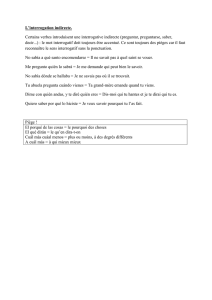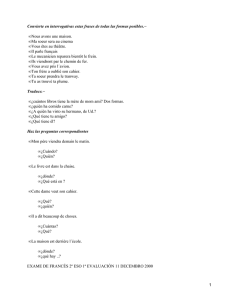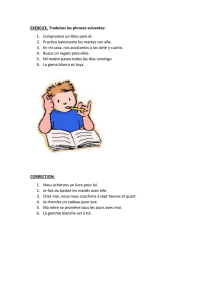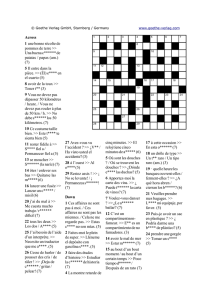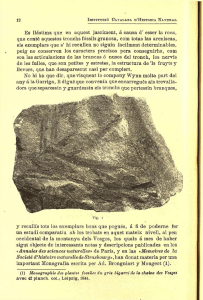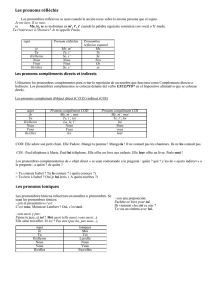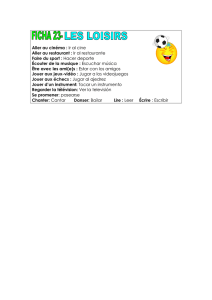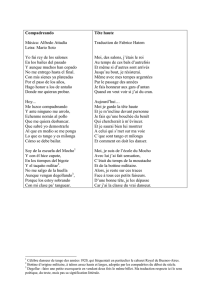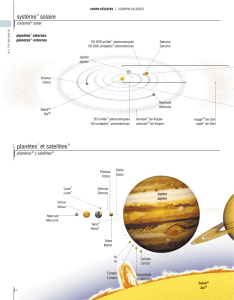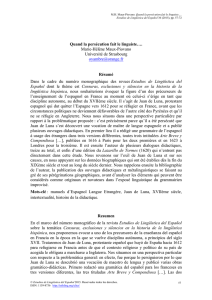Celebrations - Vincent Persichetti Texte de / text by Walt Whitman
Anuncio
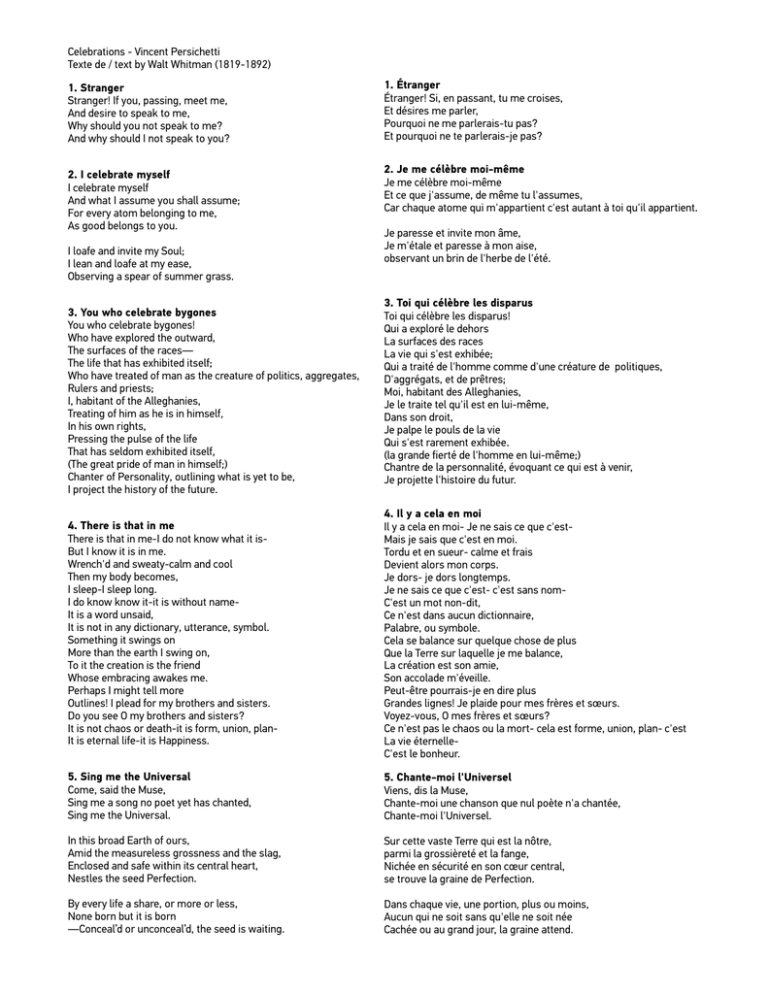
Celebrations - Vincent Persichetti Texte de / text by Walt Whitman (1819-1892) 1. Stranger Stranger! If you, passing, meet me, And desire to speak to me, Why should you not speak to me? And why should I not speak to you? 1. Étranger Étranger! Si, en passant, tu me croises, Et désires me parler, Pourquoi ne me parlerais-tu pas? Et pourquoi ne te parlerais-je pas? 2. I celebrate myself I celebrate myself And what I assume you shall assume; For every atom belonging to me, As good belongs to you. 2. Je me célèbre moi-même Je me célèbre moi-même Et ce que j'assume, de même tu l'assumes, Car chaque atome qui m'appartient c'est autant à toi qu'il appartient. I loafe and invite my Soul; I lean and loafe at my ease, Observing a spear of summer grass. 3. You who celebrate bygones You who celebrate bygones! Who have explored the outward, The surfaces of the races— The life that has exhibited itself; Who have treated of man as the creature of politics, aggregates, Rulers and priests; I, habitant of the Alleghanies, Treating of him as he is in himself, In his own rights, Pressing the pulse of the life That has seldom exhibited itself, (The great pride of man in himself;) Chanter of Personality, outlining what is yet to be, I project the history of the future. Je paresse et invite mon âme, Je m'étale et paresse à mon aise, observant un brin de l'herbe de l'été. 3. Toi qui célèbre les disparus Toi qui célèbre les disparus! Qui a exploré le dehors La surfaces des races La vie qui s'est exhibée; Qui a traité de l'homme comme d'une créature de politiques, D'aggrégats, et de prêtres; Moi, habitant des Alleghanies, Je le traite tel qu'il est en lui-même, Dans son droit, Je palpe le pouls de la vie Qui s'est rarement exhibée. (la grande fierté de l'homme en lui-même;) Chantre de la personnalité, évoquant ce qui est à venir, Je projette l'histoire du futur. 4. There is that in me There is that in me-I do not know what it isBut I know it is in me. Wrench'd and sweaty-calm and cool Then my body becomes, I sleep-I sleep long. I do know know it-it is without nameIt is a word unsaid, It is not in any dictionary, utterance, symbol. Something it swings on More than the earth I swing on, To it the creation is the friend Whose embracing awakes me. Perhaps I might tell more Outlines! I plead for my brothers and sisters. Do you see O my brothers and sisters? It is not chaos or death-it is form, union, planIt is eternal life-it is Happiness. 4. Il y a cela en moi Il y a cela en moi- Je ne sais ce que c'estMais je sais que c'est en moi. Tordu et en sueur- calme et frais Devient alors mon corps. Je dors- je dors longtemps. Je ne sais ce que c'est- c'est sans nomC'est un mot non-dit, Ce n'est dans aucun dictionnaire, Palabre, ou symbole. Cela se balance sur quelque chose de plus Que la Terre sur laquelle je me balance, La création est son amie, Son accolade m'éveille. Peut-être pourrais-je en dire plus Grandes lignes! Je plaide pour mes frères et sœurs. Voyez-vous, O mes frères et sœurs? Ce n'est pas le chaos ou la mort- cela est forme, union, plan- c'est La vie éternelleC'est le bonheur. 5. Sing me the Universal Come, said the Muse, Sing me a song no poet yet has chanted, Sing me the Universal. 5. Chante-moi l'Universel Viens, dis la Muse, Chante-moi une chanson que nul poète n'a chantée, Chante-moi l'Universel. In this broad Earth of ours, Amid the measureless grossness and the slag, Enclosed and safe within its central heart, Nestles the seed Perfection. Sur cette vaste Terre qui est la nôtre, parmi la grossièreté et la fange, Nichée en sécurité en son cœur central, se trouve la graine de Perfection. By every life a share, or more or less, None born but it is born —Conceal’d or unconceal’d, the seed is waiting. Dans chaque vie, une portion, plus ou moins, Aucun qui ne soit sans qu'elle ne soit née Cachée ou au grand jour, la graine attend. 6. Flaunt out, O sea To day, a rude brief recitative, Of ships sailing the Seas, Each with its special flag or ship-signal; Of unnamed heroes in the ships— Of waves spreading and spreading, Far as the eye can reach; Of dashing spray, And the winds piping and blowing; And out of these a chant, For the sailors of all nations, Fitful, like a surge. 6. Montre-toi, O mer arrogante Aujourd'hui un rude et bref récitatif, De navires naviguant les mers, Chacun portant son étendard; De héros sans nom dans les naviresDe vagues qui s'étendent et s'étendent, Aussi loin que l'oeil puisse voir. De l'écume giclant Et des vents qui soufflent et qui grincent; Et de ceux-ci s'éleve un chant, Pour les marins de toutes nations Agité, comme une enflée. Of Sea-Captains young or old, and the Mates— And of all intrepid Sailors; Of the few, very choice, taciturn, Whom fate can never surprise, nor death dismay, Pick’d sparingly, without noise, By thee, old Ocean— Chosen by thee,Thou Sea, That pickest and cullest the race, In Time, and unitest Nations! Suckled by thee, old husky Nurse— Embodying thee! Indomitable, untamed as thee. De capitaines jeunes ou vieux, et de matelotsEt de tous les marins intrépides; De ces quelques-uns, rares, taciturnes, Que le destin ne peut jamais surprendre, Ni la mort contrarier. Cueillis parcimonieusement, sans bruit, Par toi, veil océan- Choisis par toi, O mer, Qui sélectionne et émonde la race, à travers le temps, et unit les Nations! Allaités par toi, vieille nounou acariâtre, Te représentant! Insurmontables, indomptables, comme toi. (Toujours héroïques, sur l'eau ou sur la terre, Apparaissant seuls ou en paires, Toujours les stocks préservés, jamais éteints, Quoique rares- assez pour préserver la graine.) (Ever the heroes, on water or on land, By ones or twos appearing, Ever the stock preserv’d, and never lost, Though rare—enough for seed preserv’d.) 7. I sing the body electric I sing the body electric, The armies of those I love engirth me And I engirth them, They will not let me off till I go with them, Respond to them, And discorrupt them, and charge them full With the charge of the soul. Was it doubted that those who corrupt Their own bodies conceal themselves? And if those who defile the living Are as bad as they who defile the dead? And if the body does not do fully As much as the soul? And if the body were not the soul, what is the soul? 7. Je chante le corps électrique Je chante le corps électrique, Le corps des hommes et des femmes m'enceint Et je l'enceins, Ils n'auront ni moi de cesse que j'aille avec eux, Et leur fasse réponse et les aime. Fut-ce conjecture rêvée que les corrupteurs De leur propre corps vivant se pouvaient dissimuler? Et que les profanateurs du vivant N'étaient aussi mauvais que ceux Qui profanent le mort? Et le corps n'en fait-il pas autant que l'âme? Et si le corps n'est pas l'âme, qu'est-ce que l'âme? 8. A Clear Midnight This is thy hour O Soul, Thy free flight into the wordless, Away from books, away from art, The day erased, the lesson done, Thee fully forth emerging, silent, gazing, Pondering the themes thou lovest best : Night, sleep, and the stars. 8. Un clair minuit Voilà ton heure, O mon âme, ton vol plané dans le monde sans mots, Loin des livres, loin de l'art, le jour effacé, la leçon terminée. Tu émerge pleinement, silencieuse, observatrice, méditant les thèmes que tu préfères : La nuit, le sommeil, et les étoiles. 9. Voyage Joy! shipmate—joy! (Pleas’d to my Soul at death I cry;) Our life is closed—our life begins; The long, long anchorage we leave, The ship is clear at last—she leaps! She swiftly courses from the shore; Joy! shipmate—joy! 9. Voyage Joie! compagnon de mer- joie! (Voilà ce que je crie joyeusement à mon âme alors que la mort arrive) Notre vie est fermée-notre vie commence; Nous quittons la longue, longue escale, Le navire est au large, enfin- il bondit! Il s'éloigne rapidement du rivage; Joie! compagnon de mer- joie! Suite de Lorca – E. Rautavaara Texte de / text by Federico García Lorca (1898-1936) 1. CANCIÓN DEL JINETE Córdoba. Lejana y sola. 1. CANCIÓN DEL JINETE Courdoue. Lointaine et seule. 1. CANCIÓN DEL JINETE Cordoba. Far and lonely. Jaca negra, luna grande, Y aceitunas en mi alforja. Aunque sepa los caminos Yo nunca llegaré a Córdoba. Por el llano, por el viento, Jaca negra, luna roja. Pony noir, grande lune, Et des olives dans mes sacs Même si je connais les chemins Je n'arriverai jamais à Cordoue Par la plaines, par le vent, Poney noir, lune rouge. Black pony, big moon And olives in my bags Even if I know the paths Y never will arrive at Cordoba By the plains, by the wind, Black pony, red moon. La muerte me está mirando Desde las torres de Córdoba. ¡Ay qué camino tan largo! ¡Ay mi jaca valerosa! ¡Ay, que la muerte me espera, Antes de llegar a Córdoba! La mort me regarde Depuis les tours de Cordoue Ah! Que la route est longue! Ah! mon brave poney Ah! Que la mort m'attend Avant que d'arriver à Cordoue! Death is looking at me From the towers of Cordoba Aah! How this path is long! Aah! My brave pony Aah! How death is waiting for me Before I get to Cordoba. Córdoba. Lejana y sola. Courdoue, Lointaine et seule. Cordoba. Far and lonely. 2. El Grito La elipse de un grito Va de monte A monte. 2. Le cri L'ellipse d'un cri Va de colline En colline 2. The Scream The ellipse of a cry Goes from hill To hill Desde los olivos, Serà un arco iris negro Sobre la noche azul. À partir des oliviers, Il sera un arc-en-ciel noir Sur la nuit bleue. From the olive trees, It will trace a black rainbow On the blue night. !Ay! Ay! !Ay! Como un arco de viola, El grito ha hecho vibrar Largas cuerdas del viento. Comme un archet d'alto Le cri a fait vibrer Les longues cordes du vent Like the bow of a viola The scream has caused to vibrate The long strings of the wind. !Ay! Ay! !Ay! (Las gentes de las cuevas Asoman sus velones.) Les gens des cavernes Sortent ses cierges. (The people of the caves Bring out their candles) !Ay! Ay! !Ay! 3. La luna asoma Cuando sale la luna Se pierden las campanas Y aparecen las sendas Impenetrables. 3. La lune se lève Quand sort la lune Le cloches se perdent Et apparaissent les sentiers Impénétrables 3. The moon rises When the moon comes out The bells lose themselves And appear the paths Impenetrable. Cuando sale la luna, El mar cubre la tierra Y el corazón se siente Isla en el infinito. Quand sort la lune, La mer couvre la terre Et le coeur se sent Comme une île dans l'infini When the moon comes out The sea covers the earth And the heart feels like An island in infinity Nadie come naranjas Bajo la luna llena. Es preciso comer Fruta verde y helada. Personne ne mange des oranges Sous la pleine lune. Il faut alors manger Un fruit vert et gelé. No one eats oranges Under the full moon. You have to eat A green and frozen fruit Cuando sale la luna De cien rostros iguales, La moneda de plata Solloza en el bolsillo. Quand sort la lune De cent visages pareils La monnaie d'argent Sanglote dans la poche When the moon comes out Of one hundred identical faces, The silver money Cries in the pocket. 4. Malagueña La muerte Entra y sale De la taberna. 4. Malagueña La mort Entre et sort De la taverne 4. Malagueña Death Comes in and out Of the tavern Pasan caballos negros Y gente siniestra Por los hondo De la guitarra. Passent les chevaux noirs Et des gens sinistres Par les profondeurs De la guitare Black horses pass And sinister people Through the depths Of the guitar Y hay un olor a sal Y a sangre de hembra En los nardos febriles De la marina. Et il y a une odeur de sel Et de sang de femelle Dans les nards* fébriles Des rivages And there is an odor of salt And of female's blood In the anxious nards Of the shores. La muerte entra y sale, Y sale y entra La muerte De la taberna. La mort Entre et sort De la taverne Death comes in and out Out and in Death, Of the tavern. *Nard=fleur d'Espagne. La malagueña est un rythme ternaire traditionnel espagnol et particulièrement de Malaga. Elle a été créée à partir d'une danse accompagnée de chants au XIXe siècle. 1. Estampida Texte de / text by Miguel de Cervantes (1547-1616) Rompió, cortó, abolló, Y dijo y hizo más que en el orbe caballer andante Fué diestro, fué valiente, fué arrogante Mil agravios vengó, cien mil deshizo/deshice 1. Estampida [Sir Belianis of Greece, famous Spanish knight, speaks to Don Quixote de la Mancha] He slashed, he hewed, he cleaved he spoke and acted in a grander way than all other knights, he was clever, he was courageous, he was bold, he avenged a thousand wrongs, he foiled a hundred thousand more, Hazañas dió a la Fama ¡Ah! que eternice Fué comedido y regalado amante Fué enano para el todo gigante Y al duelo en cualquier punto satisfizo through his feats he became eternally famous, he was a courteous and delicate lover, all giants were mere dwarfs to him, in duels he gave satisfaction in all aspects, Tuvo a sus piés postrada la Fortuna Y trajo del copete su cordura A la calva Ocasión al estricote chance bowed down at his feet, he grabbed sanity by the hair at every occasion, no matter the consequence Mas, aunque sobre el cuerno de la luna Siempre se vió encumbrada su ventura, Tus proezas envidió, ¡Oh gran Quijote! and yet, though above the horn of the moon always were seen sitting his adventures it was your prowesses that he envied, Oh grand Quijote! 2. Danza Baja texte / text Anon 2. Danza Baja [King John II speaks to a Moorish slave, on the outskirts of Granada] ¡Abenámar! Abenámar, moro de la moreria, El dia en que tú naciste grandes señales habia! Estaba la mar en calma, La luna estaba crecida; Moro que en tal signo nace no debe decir mentira. -No te mentirá/no te la dirá señor, Aunque le cueste la vida -Yo te lo agradezco, Abenámar, aquesta tu cortesia. Abenamar, Abenamar, moor of the Moorish people, The day you were born, there were great signs, The sea was calm. The moon was full; A Moor born under such signs should not tell a lie. -He will not lie, he will not tell a lie, my lord, Should it cost him his life, - I am thankful, Abenamar, for your courtesy. ¿Qué castillos son aquellos? ¡Altos son y relucian! ¿Qué castillos son aquellos? ¡Abenámar! El Alhambra era, señor, y la otra la mezquita; Los otros los Alixares, labrados a maravilla. What are those castles? They are high and they shine! What are those castles? Abenamar! The Alhambra, my lord, and the other is the Mosque, And there the Alixares, marvelously wrought. El moro que los labrada cien doblas ganaba al dia Y el dia que no los labra otras tantas se perdia. -El otro es Torres Bermejas, castillo de gran valia; El otro Generalife, huerta que par no tenia. The Moor who worked on them earned a hundred gold pieces a day And on the day he did not work, he lost as many. - And those are the Vermillion Towers, a castle of great value And there the Generalife, with its unparalleled garden Alli hablára el rey don Juan, bien oireis lo que decia : -Si así quisiera, Granada, con ella se casaria; Darála en arras y dote a Córdoba y a Sevilla, -Casada soy, rey don Juan, casada soy, que no viuda; El moro que a mi tiene muy grande bien me queria. Casada soy, que no viuda, casada soy. [the king now speaks to Granada] And there spoke King Don Juan, listen to what he said: - If you so want, Granada, I will marry you; I will give you as a dowry both Cordoba and Sevilla, - I am married, King Don Juan, I am married and not widowed; The Moor whom I belong to loves me dearly I am married, not widowed, I am married. 3. Pastoral de amor texte /text anon 3. Pastoral de amor Dice el serafin : tañe con primor, Que el amor lo endulza el cornetin. Dice mi galán : hay que aprovechar, Que los besos vienen y se van. Los que aman dicen todos que el querer, Hace suspirar, hace sofocar, hace sollozar, y enloquecer. Says the seraphim: play delicately, As love softens the sound of the horn. Says my lover: one must seize the occasion As kisses come and go. Those who love all say that the desire, Makes one sigh, suffocate, sob and go mad. El galán ladrón goza sin amar, Que el gozar no es cosa de razón. Ah ¿Por qué me besó Perico? ¿ Por qué me besó el traidor? Dijo que en Francia se usaba y por eso me besaba, Y tambien porque sanaba con el beso su dolor. ¿Por qué me besó Perico? ¿ Por qué me besó el traidor? Ah 4. Rondel texte de / text by Miguel de Cervantes The dishonest lover takes pleasure without loving, As pleasure is not a matter of reason. Ah! why did Perico kiss me? Why did that traitor kiss me? He said that it was the custom in France And that is why he kissed me And also because kisses alleviate his suffering Why did Perico kiss me? Why did that traitor kiss me? Ah! ¿Quién menoscaba mis bienes? Desdenes. Y¿quién aumenta mis duelos? Los celos. Y¿quién prueba mi paciencia? Ausencia. 4. Rondel [Don Quixote and Sancho Panca chance upon Cardenio, a young man mad with love, who sings this beautiful song] What diminishes my well-being? Disdain. What aggravates my misery? Jealousy. What makes me lose my patience? Absence. De ese modo, en mi dolencia ningún remedio se alcanza, Pues me matan la esperanza. Desdenes, celos y ausencia. Thus, in my grief, I can find no remedy Because disdain, jealousy and absence All kill my hope. ¿Quién me causa este dolor? Amor. Y¿quién mi gloria repuna? Fortuna. Y¿quién consiente en mi duelo? El cielo. What is the cause of my pain? Love. And what repels my glory? Fate. And what lets in my sorrow? The heavens. De ese modo, yo recelo morir deste mal extraño, Pues se aúnan en mi daño Amor fortuna y el cielo. Thus, I fear I might die from this strange illness As love, fate, and the heavens Are united against me ¿Quién mejorará mi suerte? La muerte. Y el bien de amor , ¿quién le alcanza? Mudanza. Y sus males, ¿quien los cura? Locura. What could better my condition? Death. And what brings the joy of love? Inconstancy. And what is the cure for love's ills? Folly. De ese modo, no es cordura querer curar la pasión, Cuando los remedios son Muerte, mudanza y locura. Thus, it does not make sense to seek to cure passion If the remedies are Death, inconstancy and folly. Traductions fournies par François A. Ouimet Translations provided by François A. Ouimet
